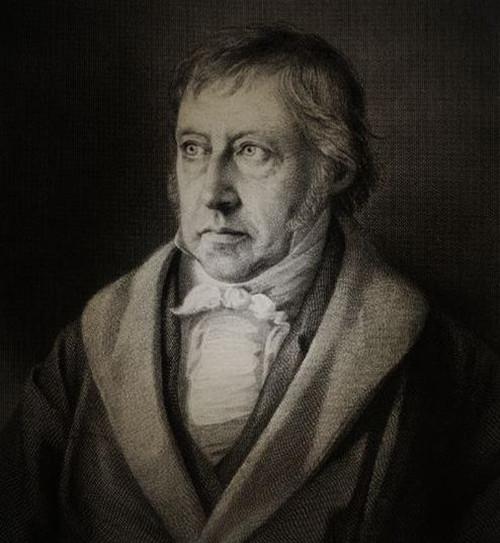
Friends who have read the "Romance of the Three Kingdoms" must be very familiar with this sentence: "The general trend of the world, for a long time will be united, and for a long time it will be divided." "There were many dynasties in ancient China, and the succession of dynasties and dynasties laid the foundation for the history of Chinese civilization, but this history of civilization was not progressive in the eyes of some foreign scholars, and the German philosopher Hegel (1770-1831) once expressed a similar view.
Hegel was one of the representatives of German idealistic philosophy in the 19th century, and many of his famous quotes are classic:
"It's not the lack of beauty in the world, it's the lack of discovery."
"Evil is the driving force behind development."
"The lesson that mankind has learned from history is that mankind never remembers the lessons of history."
Hegel lived in a time when China was in the midst of the Qing Dynasty, and the empire turned from prosperity to decline. Hegel argues that although China has continued its civilization for thousands of years, it seems remarkable, but "Chinese history is essentially historyless, it is just a repetition of the overthrow of the monarch, and no progress can be produced from it." ”
Why did the philosopher say that? If we talk about the overthrow of monarchs, haven't they been destroyed in the history of the West? The history of China's feudal dynasties began with the establishment of the Qin Dynasty in 221 BC and continued to the era of Hegel, in which not only the emperor was changing, but also the progress of production technology, the progress of invention and transformation, are these worthless in Hegel's eyes?
Popular interpretation of Hegel's words, meaning that China's more than 2,000 years of feudal dynasty, has always been "the emperor takes turns to do, next year to my home", Qin and Han three kingdoms, two Jin, Southern and Northern Dynasties, Sui and Tang Dynasty Five Dynasties Song Yuan Ming and Qing Dynasty, the winner for the king and the loser for Kou, although the emperor and the dynasty have changed, but the people's thinking is still because of the feudal system and ignorant, full of servility, by the nobles over the head, if not really can not live, then do not know how to resist some unreasonable things.
Therefore, in the modern period of the Republic of China, many people of insight called on people to emancipate their minds and stop being poisoned by feudalism, and there was also great resistance in it, just like Mr. Lu Xun's Xianglin sister-in-law, she was obviously forced to remarry, in the eyes of those people with strong feudal ideas, remarriage is "unclean person", so she died tragically. This deep-rooted rotten mind remains unchanged, and the suffering at the bottom is a cycle of repetition.
In Hegel's view, China's feudal dynasty history is a cannon fodder as a stepping stone, so that the imperial power and aristocrats enjoy life from above, "a big casino, villains take turns to sit in the village, bastards change shifts to guard", so whether it is Qin Shi Huang or the Kangxi Emperor Qianlong Emperor, they are essentially the same, and if they do not completely overthrow such a dynastic reincarnation, it is not considered historical progress.
In fact, Hegel's words are difficult to accept at first, but after understanding his views on history, it cannot be said that there is no merit. In his concept, the continuation of light time can not actually be regarded as history, the history of mankind should have been a change in the process of human activities, so simply repeating the overthrow and regeneration of dynasties, human activities have not changed from low to high, this change is not enough to be called historical transformation.
In the last years of the Qing Dynasty, with opium as the fuse, the great powers opened the door of China, and since then, Lin Zexu, Wei Yuan and others have begun to open their eyes to the world and realize that their country has lagged behind the forest of the world, and then Liang Qichao, Lu Xun and others have committed to replacing the "old" with "new", which is a great change.
In Hegel's view, from the Qin Dynasty to the Qing Dynasty, the history of China's feudal dynasties lacked introspection, but constantly strengthened the original shortcomings, this history objectively exists, but there is no confrontation between it and the subjective movement, only unreasonable reinforcement - zhang zhidong, Zeng Guofan and other people at the end of the Qing Dynasty want to learn Western technology, maintain the feudal rule of the Qing Dynasty, and launch a "foreign affairs movement", which is a kind of change that covers the ears and rings the bell, not a real change, because they are really rotten and backward things they do not want to touch.
We should not humble ourselves for our culture, but neither should the spirit of doubt, criticism and denial of introspection be lost. As Hegel said, there are irrational and deadly things in traditional Chinese culture, and these things are still deeply rooted in our minds with the passage of time, people cannot progress in history and cannot progress, and people's servile consciousness stays, which is the "trap of culture."